Would You Play?
![CFB%202015-10-03%20ARIZONA%20AT%20STANFORD%20MELT%20CHRISTIAN%20MCCAFFREY%20INTERVIEW.00_00_59_27.Still001__1443942329[1]](http://kentuckysportsradio.com/wp-content/uploads/2016/01/CFB202015-10-0320ARIZONA20AT20STANFORD20MELT20CHRISTIAN20MCCAFFREY20INTERVIEW.00_00_59_27.Still001__14439423291-600x338.jpg) Stanford RB Christian McCaffery[/caption]You're a college football phenom. After helping lead your team to a solid winning season -- short of the championship playoffs, but entry into a prominent, albeit absurdly-monickered postseason bowl game -- scouting services project you as an early round NFL draft pick next year. After growing up with modest means (or perhaps even in abject poverty), you stand to earn a paycheck next year worth hundreds of thousands, if not millions, of dollars...life-altering money...enough to seed your retirement, help your family, maybe even buy a little bling and a few new toys. The only thing standing in the way is the risk of a career-threatening, or draft-position-debilitating, injury in a game that, aside for bragging rights and school pride, is mostly meaningless.
Would you play?
Running backs Leonard Fournette of LSU and Christian McCaffrey of Stanford both answered no. Playing the most injury-vulnerable position on the gridiron, each risked a significant, if not existential, financial loss. Both, of course, were pilloried in the angry social media: by their fan bases who viewed them as traitors, as well as by some old-school analysts who believed they violated the fundamental tough-guy, play-even-if-it-hurts ideology of the sport. (By the way, both LSU and Stanford won without them.)
Michigan tight end Jake Butt answered yes. During Friday night's Orange Bowl matchup with Florida State, Butt suffered a torn ACL, placing his once likely first-round NFL draft selection into jeopardy. For what it's worth, Butt had no regrets, later tweeting that it "never once crossed my mind to sit this game out and I would never change that mindset. I play this game bc I love it, my teammates, coaches." (The Wolverines lost in a squeaker.)
Would you play?
For those of us in the contact-averse, receiver-route-running-challenged intelligentsia, the answer seems simple: As a standard economic calculation, a "no" answer is obvious. But for decades, Fournette and McCaffrey are the clear exceptions, as rare as ACLU-placard-sighting at a Donald Trump rally. Beyond the traditions of the game, beyond the peer pressure from fans and fellow students; appearing as a "quitter" or a "coward" or a "non-team player," could impact a player reputationally, and perhaps even financially, in the short and long run.
But that's changing. As scrutiny into the long-term impact of football injuries expands, as NFL salaries spiral, and perhaps most significantly, as the obscene absurdity of big-time college athletics continues to be exposed as preying upon the young people who actually fill the seats and drive up the TV ratings, the old-school view is losing its hold. Athletes have taken up for their teammates and rivals on Twitter, and columnists are complementing the sit-inners. If at the 2017 draft Fournette and McCaffrey soar, while Butt plummets, a large number of their successors will be carefully considering skipping bowl games this time next year. And if the trend continues, a slippery slope could lead to stars skipping meaningful playoff games, or even large chunks of regular seasons.
There's no easy solution, but some salve can come in a remedy for much of what else is ailing college athletics: It's time we pay and truly educate college athletes.
As I explored more comprehensively in this 2014 KSR column, the NCAA, elite coaches, broadcast networks, and advertisers are acquiring ridiculous wealth at the expense of student athletes who don’t earn a dime. Worse, more than a quarter of major sport athletes don’t graduate; and many that do fail to develop any meaningful job skills, or even middle school level reading skills.
While the NCAA two years ago voted to give a few conferences a little more freedom to compensate their students, it seemed more of a sham aimed at blocking comprehensive change being sought through the court system. The NCAA should instead establish a meaningful pay-for-play system: one that colleges can afford; but most importantly, one whose focus is laser-trained on the welfare of student-athletes. It could look something like this:
Pay the players a living wage. An hourly living wage – the same for each player on scholarship -- would provide athletes with some walking around money for the occasional restaurant jaunt or shopping spree, as well as the exceptional luxury of flying parents in for special games. And it won’t break the bank of our institutions of higher learning. Of course, schools would be burdened less if we identified supplemental funding sources such as…
It’s gotta be the shoes. While recent reforms have proscribed many of the abuses in the historically shady relationship between college coaches and shoe companies, it’s still unjust to force players to serve as unpaid jumping billboards for their product. A fair percentage of any and all endorsement deals could help underwrite an athlete compensation pool. Taken together, this fund could help sweep in athletes beyond just the two major revenue-generating sports, because…
Don’t forget about the girls. Gender equity in college athletics is one of the great successes of the modern civil rights era. And even though on only rare occasions will a women’s team generate meaningful revenue, the spirit, if not the letter, of the Title IX laws may require colleges to pay women the same as the boys. And speaking of what's truly important...
It’s the education, stupid. The primary mission of any university is to educate and prepare its students for the postgraduate job market. Current athletic academic standards instead often function to stifle opportunity or to encourage inappropriate shortcuts. The core flaw is the ludicrous and pernicious assumption that every “scholar-athlete” has the preparation, the aptitude – or even the need – to earn a four-year, liberal arts bachelor’s degree. For decades, outside of sport, policymakers have been encouraging youth from lower income environments and underachieving high schools (a common background for many a collegiate hoopster or gridder) to enroll in two-year vocational and technical colleges, where they can be empowered with the skills they need for the modern job market. That’s why it is incumbent on the NCAA and its member schools to direct athletes, when appropriate, to focus their academic attention on job skills and technical programs that interest them, prepare them for postgraduate life, and enable them to earn associates degrees at the university, or through an affiliated community college or vo-tech program. Similarly, the NBA, NFL and their players’ unions should effectuate a new “two and done” system, which will enable each player to earn sufficient credit to graduate with at least an associates’ degree. And those that stay on past their two-year degrees can be enrolled in apprenticeship programs with local businesses, or compensated job training in the workplace.
In the end, we should abide by the motto and mission of our Fayette County Public Schools: “It’s About Kids.” In our passion for sports, we too often fail to fully appreciate and protect the interests of the teenagers and young adults who provide so much enjoyment for the rest of us. While the Fournettes and the McCaffreys might still skip a game or two, we would provide meaningful integrity for a system that truly needs it, and we would finally respect, honor and truly compensate the individuals who make college sports possible.
===
Would you play? Should we pay? Fire away in the comments below.
Stanford RB Christian McCaffery[/caption]You're a college football phenom. After helping lead your team to a solid winning season -- short of the championship playoffs, but entry into a prominent, albeit absurdly-monickered postseason bowl game -- scouting services project you as an early round NFL draft pick next year. After growing up with modest means (or perhaps even in abject poverty), you stand to earn a paycheck next year worth hundreds of thousands, if not millions, of dollars...life-altering money...enough to seed your retirement, help your family, maybe even buy a little bling and a few new toys. The only thing standing in the way is the risk of a career-threatening, or draft-position-debilitating, injury in a game that, aside for bragging rights and school pride, is mostly meaningless.
Would you play?
Running backs Leonard Fournette of LSU and Christian McCaffrey of Stanford both answered no. Playing the most injury-vulnerable position on the gridiron, each risked a significant, if not existential, financial loss. Both, of course, were pilloried in the angry social media: by their fan bases who viewed them as traitors, as well as by some old-school analysts who believed they violated the fundamental tough-guy, play-even-if-it-hurts ideology of the sport. (By the way, both LSU and Stanford won without them.)
Michigan tight end Jake Butt answered yes. During Friday night's Orange Bowl matchup with Florida State, Butt suffered a torn ACL, placing his once likely first-round NFL draft selection into jeopardy. For what it's worth, Butt had no regrets, later tweeting that it "never once crossed my mind to sit this game out and I would never change that mindset. I play this game bc I love it, my teammates, coaches." (The Wolverines lost in a squeaker.)
Would you play?
For those of us in the contact-averse, receiver-route-running-challenged intelligentsia, the answer seems simple: As a standard economic calculation, a "no" answer is obvious. But for decades, Fournette and McCaffrey are the clear exceptions, as rare as ACLU-placard-sighting at a Donald Trump rally. Beyond the traditions of the game, beyond the peer pressure from fans and fellow students; appearing as a "quitter" or a "coward" or a "non-team player," could impact a player reputationally, and perhaps even financially, in the short and long run.
But that's changing. As scrutiny into the long-term impact of football injuries expands, as NFL salaries spiral, and perhaps most significantly, as the obscene absurdity of big-time college athletics continues to be exposed as preying upon the young people who actually fill the seats and drive up the TV ratings, the old-school view is losing its hold. Athletes have taken up for their teammates and rivals on Twitter, and columnists are complementing the sit-inners. If at the 2017 draft Fournette and McCaffrey soar, while Butt plummets, a large number of their successors will be carefully considering skipping bowl games this time next year. And if the trend continues, a slippery slope could lead to stars skipping meaningful playoff games, or even large chunks of regular seasons.
There's no easy solution, but some salve can come in a remedy for much of what else is ailing college athletics: It's time we pay and truly educate college athletes.
As I explored more comprehensively in this 2014 KSR column, the NCAA, elite coaches, broadcast networks, and advertisers are acquiring ridiculous wealth at the expense of student athletes who don’t earn a dime. Worse, more than a quarter of major sport athletes don’t graduate; and many that do fail to develop any meaningful job skills, or even middle school level reading skills.
While the NCAA two years ago voted to give a few conferences a little more freedom to compensate their students, it seemed more of a sham aimed at blocking comprehensive change being sought through the court system. The NCAA should instead establish a meaningful pay-for-play system: one that colleges can afford; but most importantly, one whose focus is laser-trained on the welfare of student-athletes. It could look something like this:
Pay the players a living wage. An hourly living wage – the same for each player on scholarship -- would provide athletes with some walking around money for the occasional restaurant jaunt or shopping spree, as well as the exceptional luxury of flying parents in for special games. And it won’t break the bank of our institutions of higher learning. Of course, schools would be burdened less if we identified supplemental funding sources such as…
It’s gotta be the shoes. While recent reforms have proscribed many of the abuses in the historically shady relationship between college coaches and shoe companies, it’s still unjust to force players to serve as unpaid jumping billboards for their product. A fair percentage of any and all endorsement deals could help underwrite an athlete compensation pool. Taken together, this fund could help sweep in athletes beyond just the two major revenue-generating sports, because…
Don’t forget about the girls. Gender equity in college athletics is one of the great successes of the modern civil rights era. And even though on only rare occasions will a women’s team generate meaningful revenue, the spirit, if not the letter, of the Title IX laws may require colleges to pay women the same as the boys. And speaking of what's truly important...
It’s the education, stupid. The primary mission of any university is to educate and prepare its students for the postgraduate job market. Current athletic academic standards instead often function to stifle opportunity or to encourage inappropriate shortcuts. The core flaw is the ludicrous and pernicious assumption that every “scholar-athlete” has the preparation, the aptitude – or even the need – to earn a four-year, liberal arts bachelor’s degree. For decades, outside of sport, policymakers have been encouraging youth from lower income environments and underachieving high schools (a common background for many a collegiate hoopster or gridder) to enroll in two-year vocational and technical colleges, where they can be empowered with the skills they need for the modern job market. That’s why it is incumbent on the NCAA and its member schools to direct athletes, when appropriate, to focus their academic attention on job skills and technical programs that interest them, prepare them for postgraduate life, and enable them to earn associates degrees at the university, or through an affiliated community college or vo-tech program. Similarly, the NBA, NFL and their players’ unions should effectuate a new “two and done” system, which will enable each player to earn sufficient credit to graduate with at least an associates’ degree. And those that stay on past their two-year degrees can be enrolled in apprenticeship programs with local businesses, or compensated job training in the workplace.
In the end, we should abide by the motto and mission of our Fayette County Public Schools: “It’s About Kids.” In our passion for sports, we too often fail to fully appreciate and protect the interests of the teenagers and young adults who provide so much enjoyment for the rest of us. While the Fournettes and the McCaffreys might still skip a game or two, we would provide meaningful integrity for a system that truly needs it, and we would finally respect, honor and truly compensate the individuals who make college sports possible.
===
Would you play? Should we pay? Fire away in the comments below.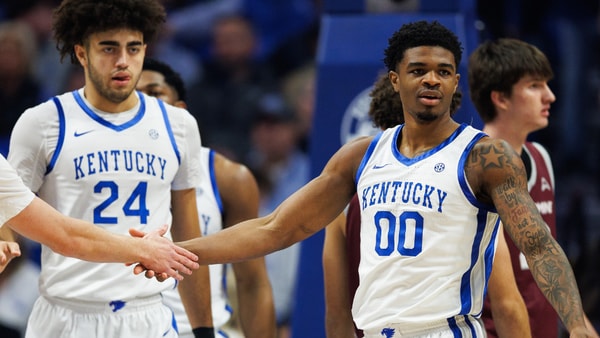
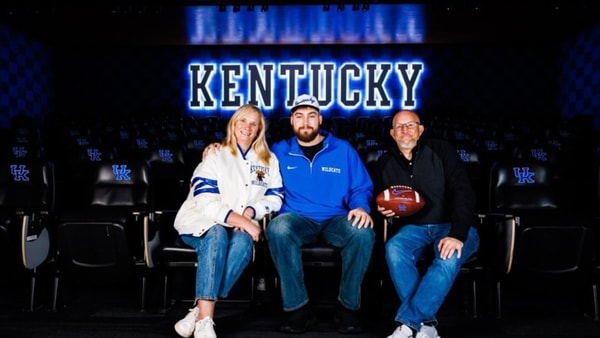
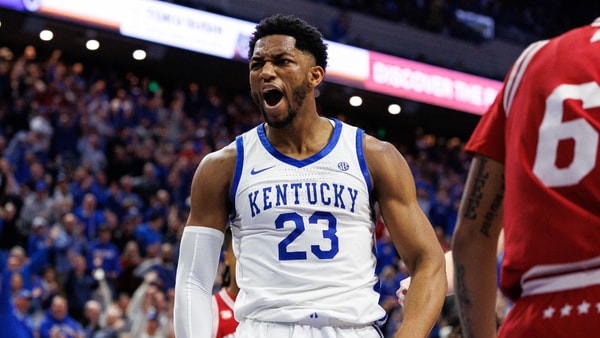
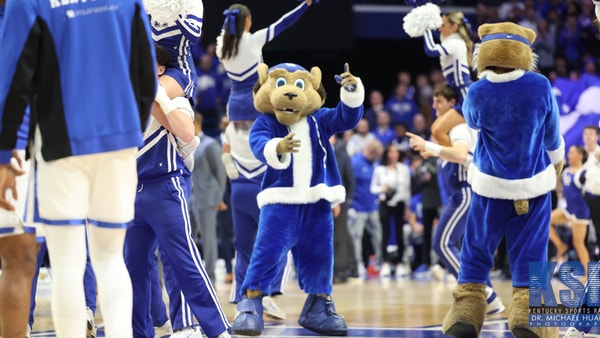
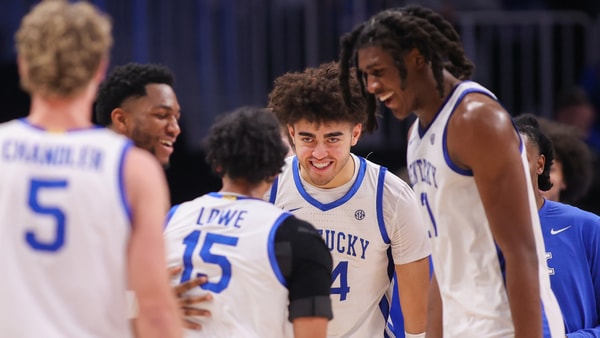
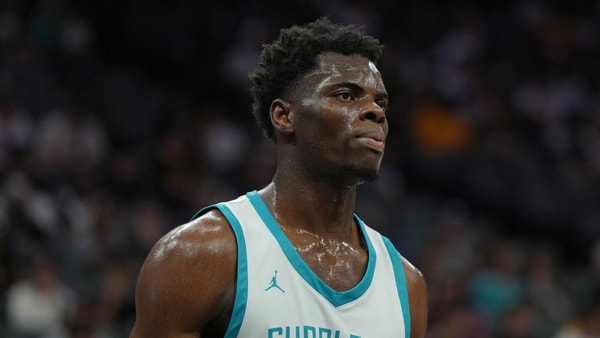
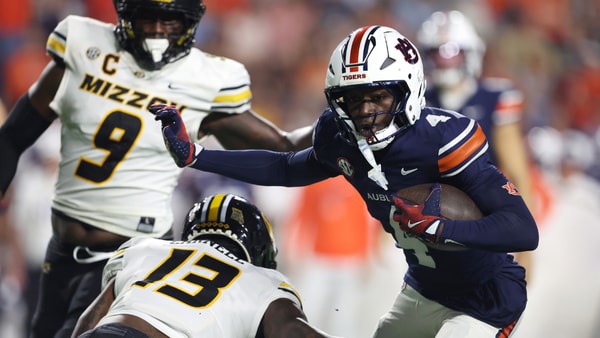
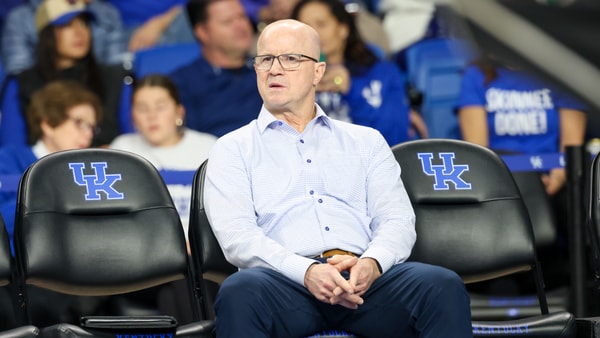
Discuss This Article
Comments have moved.
Join the conversation and talk about this article and all things Kentucky Sports in the new KSR Message Board.
KSBoard